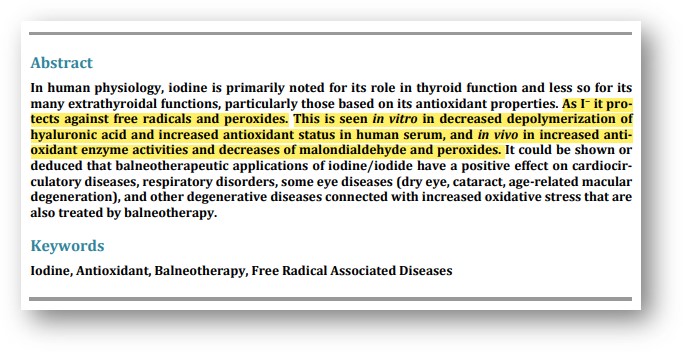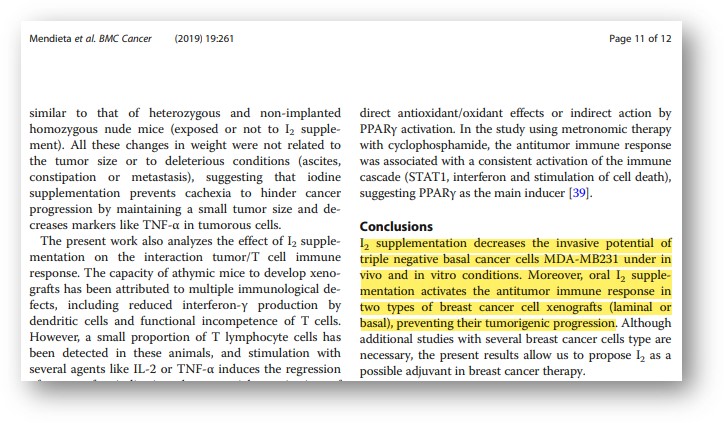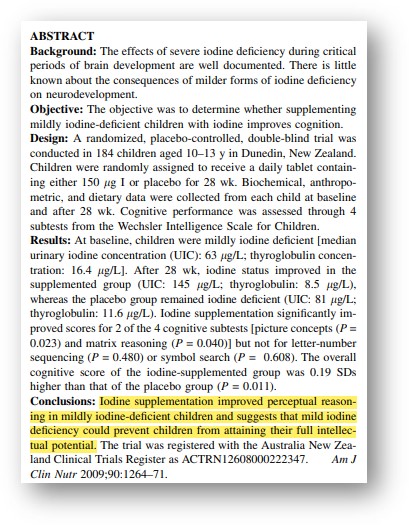Is it only good for the thyroid? Iodine benefits in papers
2. Antitumor
Hello. I'm a pharmacist Jinny.
Did you know that regardless of the level of health care in each country, iodine is an essential nutrient that is often lacking around the world? Iodine is a mineral abundant in seaweed such as kelp and seaweed, and it is a nutrient that is easily deficient depending on dietary habits.
Iodine is required for the synthesis of thyroxine, a thyroid hormone, and is widely considered an essential nutrient that contributes to thyroid health, as a deficiency can lead to goiter. Thyroid hormones are involved in energy metabolism by regulating the body's metabolic rate, and are important for the development of the central nervous system by promoting mRNA and protein synthesis.
However, iodine has many benefits other than thyroid health, and today I would like to introduce the various functions of the essential nutrient iodine through a paper.
In 2015, Natural Science published a review article summarizing nearly 50 years of scientific research on the role of iodine in defense mechanisms against various diseases and its benefits in body tissues other than the thyroid gland [1].
The benefit of iodine that we focus on the most in this paper is its antioxidant properties

"Iodine has protection against free radicals and peroxides. This can be observed in in vitro experiments through reduced depolymerization of hyaluronic acid and increased antioxidant status of human serum, increased antioxidant enzyme activity in vivo, and reduced malondialdehyde and peroxides."
The immune system plays an important role not only in basic health, but also in the progression or regression of tumors. Research on the link between iodine and immunomodulation has been accumulating since the 1980s, and naturally led to academic research to determine the link between iodine supplementation and anti-tumor immune responses.
A 2019 study was published in BMC Cancer reporting the effects of iodine on human breast cancer cell lines with high metastasis potential in vitro and in vivo [2].

"Supplementation of iodine reduces the likelihood of invasion of triple-negative basal cancer cells under in vivo and in vitro conditions. Furthermore, oral supplementation of iodine activates anti-tumor immune responses in both types of breast cancer cells, preventing tumorigenesis progression."
The most common iodine deficiency is goiter and cretin. While the risks of severe iodine deficiency are well understood, the effects of mild iodine deficiency are not well understood, and finally, we want to look at the effects of mild iodine deficiency and the benefits of iodine supplementation.
A 2009 study in The American Journal of Clinical Nutrition reported the results of a randomized, placebo-controlled, double-blind trial in New Zealand that evaluated the effects of iodine supplementation on 184 children aged 10~13.

"Iodine supplementation improved perceptual reasoning in children with mild iodine deficiency and suggests that mild iodine deficiency may prevent children from achieving their full intellectual potential."
Today, we've looked at the various benefits of iodine that have been validated by the scientific community. According to the Korean Nutritional Intake Standards, the recommended daily intake of iodine for male and female adults and the elderly in Korea is 150μg, 240μg for pregnant women and 330μg for lactating women.
I hope you have a healthy day in body and mind. It was Jinny.
[1] Winkler, R. (2015). Iodine—a potential antioxidant and the role of Iodine/Iodide in health and disease. Natural Science, 7(12), 548.
[2] Mendieta, I., Nuñez-Anita, R. E., Nava-Villalba, M., Zambrano-Estrada, X., Delgado-González, E., Anguiano, B., & Aceves, C. (2019). Molecular iodine exerts antineoplastic effects by diminishing proliferation and invasive potential and activating the immune response in mammary cancer xenografts. BMC cancer, 19(1), 1-12.
[3] Gordon, R. C., Rose, M. C., Skeaff, S. A., Gray, A. R., Morgan, K. M., & Ruffman, T. (2009). Iodine supplementation improves cognition in mildly iodine-deficient children. The American journal of clinical nutrition, 90(5), 1264-1271.



![[Oral lactic acid bacteria efficacy] There are also lactic acid bacteria that are good for bad breath and periodontitis](http://esther-mall.com/cdn/shop/articles/78.jpg?v=1734066859&width=480)
